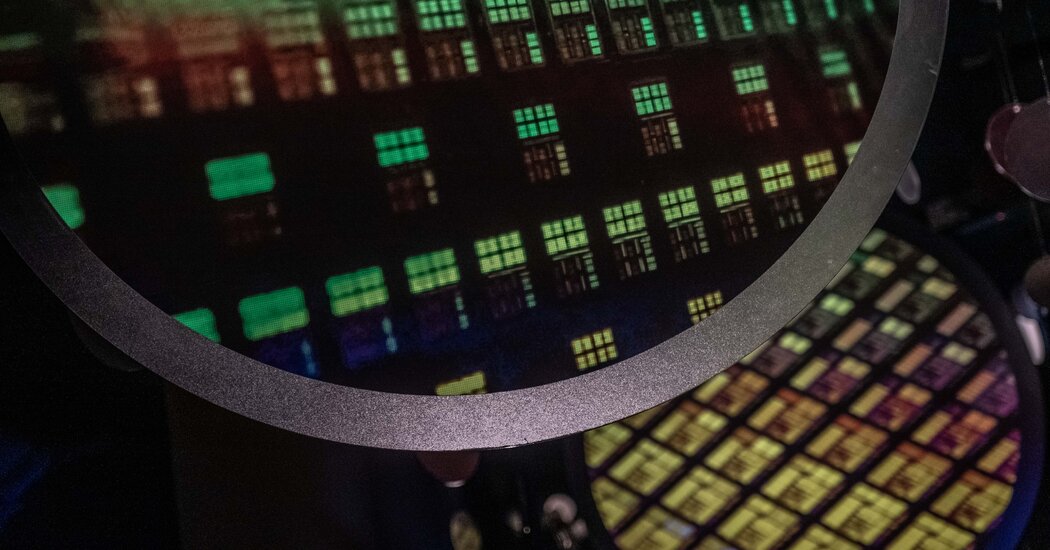Here is the plain text result:
The Trump administration took steps on Monday that appear likely to result in new tariffs on semiconductors and pharmaceutical products, adding to the levies President Trump has put on imports globally.
Federal notices put online Monday afternoon said the administration had initiated national security investigations into imports of chips and pharmaceuticals. Mr. Trump has suggested that those investigations could result in tariffs.
The investigations will also cover the machinery used to make semiconductors, products that contain chips and pharmaceutical ingredients.
In a statement confirming the move, Kush Desai, a White House spokesman, said the president “has long been clear about the importance of reshoring manufacturing that is critical to our country’s national and economic security.”
The new semiconductor and pharmaceutical tariffs would be issued under Section 232 of the Trade Expansion Act of 1962, which allows the president to impose tariffs to protect U.S. national security.
Earlier in the day, Mr. Trump hinted that he would soon impose new tariffs on semiconductors and pharmaceuticals, as he looked to shore up more domestic production.
Semiconductors are used to power electronics, cars, toys and other goods. The United States is heavily dependent on chips imported from Taiwan and elsewhere in Asia, a reliance that Democrats and Republicans alike have described as a major risk to national security.
As for pharmaceuticals, Mr. Trump argued that too many vital medicines were imported. “We don’t make our own drugs anymore,” he said.
Some drugs are produced at least in part in the United States, though China, Ireland and India are significant sources of some types of pharmaceuticals.
Mr. Trump also signaled Monday that he could offer certain companies relief from his tariffs, as he did for electronics imports in recent days — a break from his past insistence that he would not spare entire industries.
The president has announced significant changes over the last week to his trade agenda, which has roiled markets and spooked the businesses that he is trying to persuade to invest in the United States.
Mr. Trump has already used the legal authority under Section 232 to issue tariffs on imported steel, aluminum and automobiles. The administration is also using the authority to carry out investigations into imports of lumber and copper.
The notices on Monday said the administration had begun its investigations into imports of pharmaceuticals and semiconductors on April 1. Neither the White House nor the president previously said the process had officially begun.
Kevin Hassett, the director of the White House National Economic Council, told reporters on Monday that the chip tariffs were needed for national security.
“Some tech companies have been responsive to the president’s requests to build more in the United States. Taiwan Semiconductor Manufacturing Company, the world’s largest chip manufacturer, announced at the White House in March that it would spend $100 billion in the United States over the next four years to expand its production capacity.
Apple has announced that it will spend $500 billion in the United States over the next four years to expand facilities around the country.
On Monday, Nvidia, the chipmaker, announced that it would produce supercomputers for artificial intelligence made entirely in the United States. In the next four years, the company said, it will produce up to $500 billion of A.I. infrastructure in the United States in partnership with TSMC and other companies.
However, some critics have questioned how much tariffs will really help to bolster the U.S. industry, given that the Trump administration is also threatening to pull back on grants given to chip factories by the Biden administration. And foreign governments like China, Japan, South Korea and Taiwan all subsidize semiconductor manufacturing heavily with tools like grants and tax breaks.
Globally, 105 new chip factories, or fabs, are set to come online through 2028, according to data compiled by SEMI, an association of global semiconductor suppliers. Fifteen of those are planned for the United States, while the bulk are in Asia.
Mr. Trump has criticized the CHIPS Act, a $50 billion program established under the Biden administration and aimed at offering incentives for chip manufacturing in the United States. He has called the grants a waste of money and insisted that tariffs alone are enough to encourage domestic chip production.
However, the United States on its own only accounts for about a quarter of all global demand for goods with chips in them, so working with allied nations is critical.
Administration officials have suggested that chip tariffs could be applied to semiconductors that come into the United States within other devices.
Source link




